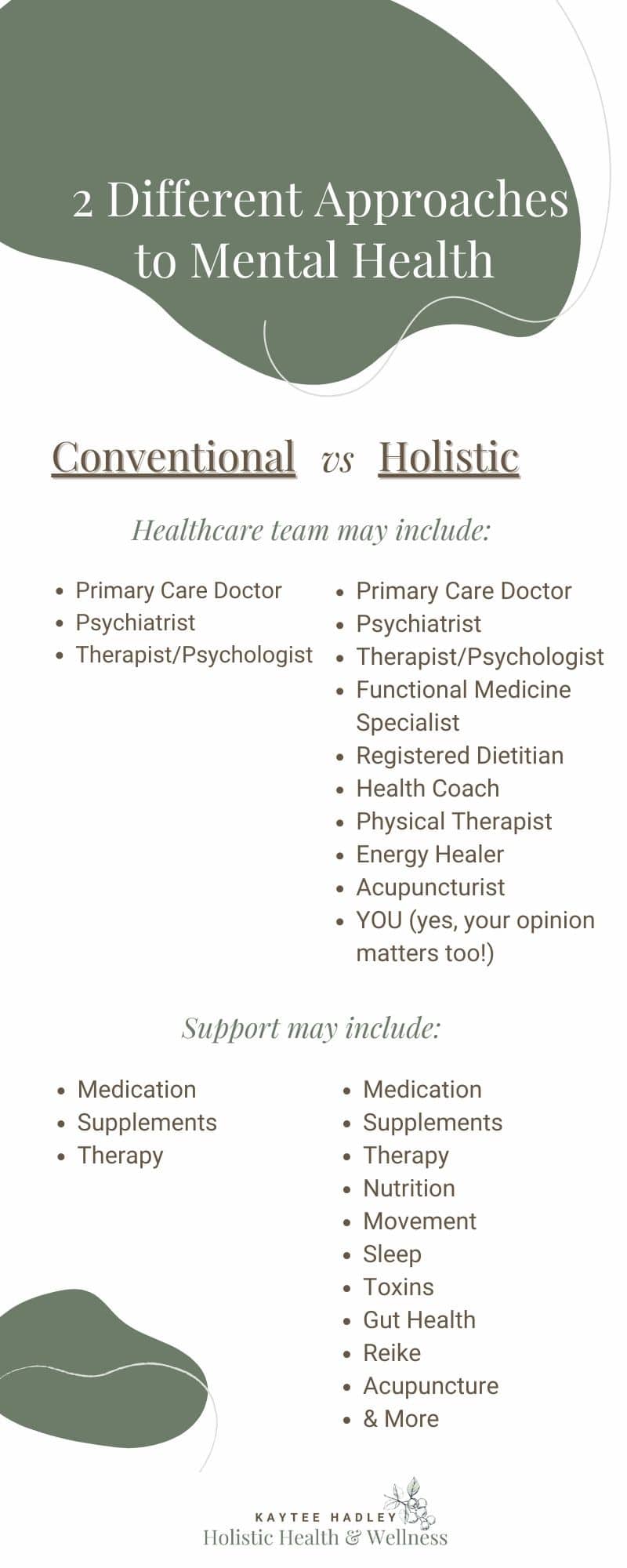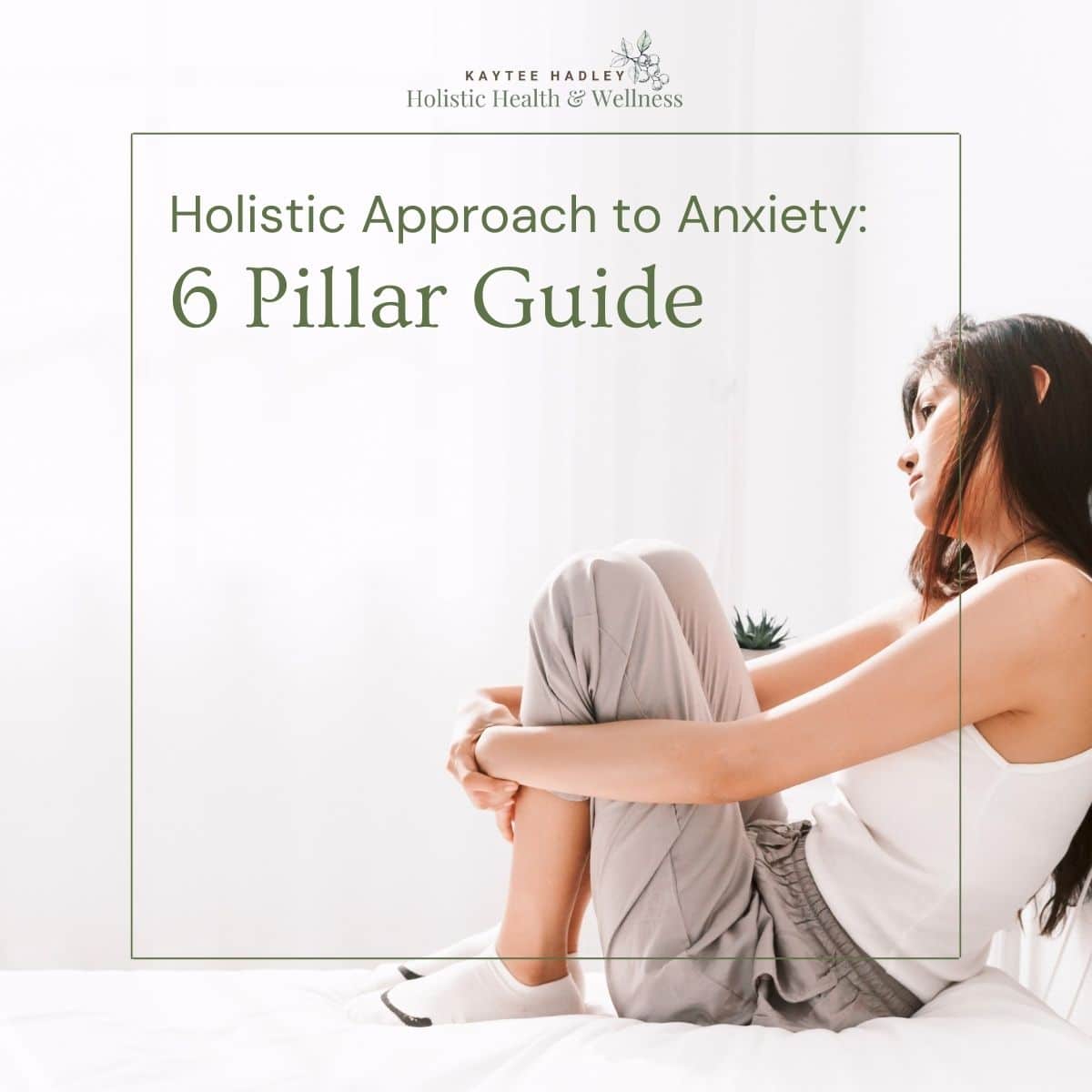Health science has come a long way in the past several decades. What we used to think of as ‘healthy’ has changed immensely, and perhaps even our definition of health has changed.
We used to think of mental health as separate from the rest of the body, but now we know that the two are innately connected. This knowledge allows us to take a more holistic approach to mental health, which is more effective and provides better health outcomes.
In this article, we explore 1) what holistic mental health is, 2) what to expect from this approach, and 3) how to achieve it.
So if you’ve ever wondered if there is more you can do to support your mental health, read on!
Want to save this article to reference later? Click here to get a PDF copy delivered to your inbox.
Holistic Mental Health
Table of Contents
What it is
Holistic mental health refers to creating wellness in a person’s whole being. This approach considers the mind-body connection and all aspects of the person (including social, emotional, physical, psychological, behavioral, and environmental).
Additionally, this approach focuses on addressing the root causes of disease instead of just managing symptoms and is founded on the belief that health is more than just the lack of illness. It is a state of optimal wellness.
Through this lens, symptoms of poor mental health such as depression, anxiety, high stress, and mood swings are a result of psychological, social, biological, emotional, and perhaps even spiritual factors that can all be addressed to create whole body health.
This holistic approach to mental health is not a replacement for traditional healthcare but is in addition to it. It is personalized based on each individual’s needs and includes lifestyle interventions such as nutrition and exercise.
Why a Holistic Approach is Important in Mental Health
Studies have shown that people with mental illness have a lower quality of life, worse health outcomes, and higher rates of death, with an average of 10 YEARS of life lost!
In part, this is because mental and physical health are innately connected. Mental illness can be caused or influenced by genetic, experiential, and environmental factors such as physical imbalances, neurological issues, trauma, and bodily health. Therefore, we cannot ignore the mind-body connection.
Mind-Body Connection
The term mind-body connection refers to the impact that these two parts of a person have on one another and the individual’s health.
This influence is bi-directional, meaning the mind influences the health of the body, and the body’s health also impacts the mind.
Managing mental health symptoms such as anxiety, depression, and mood swings is essential for daily functioning. However, the focus also needs to be on addressing the underlying cause of the symptoms.
Many people may find it empowering to know that there is more they can do to improve their mental health besides taking medication and receiving psychological support.
Unfortunately, while many healthcare practitioners know that more can be done to support mental health, the treatment is often disjointed and incomplete because the healthcare system has separate specialties for mental and physical health.
This split creates a disjointed approach to mental health, and the impact of physical health and lifestyle habits (such as nutrition, sleep, and movement) on mental health, is often neglected. When this occurs, an important aspect of the mind-body connection is left unaddressed.
Benefits of Holistic Mental Health
This integrated approach improves both physical and mental health synergistically and can lead to better outcomes in both areas. All systems of the body and person are involved, and the mind becomes a healing tool.
Furthermore, addressing the root causes, correcting physical imbalances, and creating a lifestyle that promotes wellness leads to more sustainable whole body health.
How do you Achieve It?
Working with a specialized healthcare practitioner is key to achieving holistic mental health.
Functional medicine practitioners treat the body as a whole and address underlying causes to restore health. They can provide the necessary support and guidance and collaborate with the rest of the healthcare team for an integrated approach.
The practitioner will first complete an assessment to identify where the person is in their health journey and define their goals.
They will hear the person’s story and put together a health timeline to identify antecedents, triggers, and mediators. They will then piece together a picture of the person’s whole body health, including physical, mental, spiritual, and emotional components.
They may also look deeper to assess imbalances by running functional labs such as testing for gut health, mycotoxins, and nutritional status.
Then, they will identify how lifestyle plays a role in the person’s health and create an individualized plan to get them from where they are now to where they want to be.
Lifestyle Pillars of Mental Health
Creating a sustainable lifestyle that supports wellness long term is essential for achieving holistic mental health.
A provider that is well-versed in these six lifestyle components of health can provide support with creating whole body health.
1. Personalized Nutrition
Diet and nutritional status is an important factor for improving mental health. Considerations for mental health include vitamin or mineral deficiencies, gut health, and nutrients that support the brain and decrease inflammation.
The goal is to create a sustainable eating pattern that nourishes the body and brain long-term. Additionally, personal preferences and cultural practices should be taken into consideration when developing this nutritional plan.
2. Functional Fitness
Movement is another lifestyle pillar for creating whole body health, as it has psychological benefits and can improve symptoms of depression and anxiety. Both planned exercise and non-exercise activities (such as walking the dog or gardening) can help create functional fitness.
3. Optimized Circadian Rhythm
All cells in the body have a sleep-wake cycle that is necessary for both physical and mental health. A practitioner can provide tools, techniques, and strategies to get consistent and adequate rest and have optimal energy during the day.
4. Reduced Toxic Load
A buildup of environmental toxins in the body can also negatively impact hormones and mental health. This toxic load is addressed by reducing exposure to the toxins and supporting the body’s natural ability to eliminate them.
5. Daily Mindfulness
The benefits of mindfulness are well established and include reducing anxiety and improving mood. Meditation, biofeedback, and mind-body practices are just a few of the mindfulness practices that can be incorporated into a daily routine to foster health.
6. Supportive Community
Finally, it is essential to have support from both a healthcare team and also friends and family. Adequate social support is essential to every person but is especially relevant for individuals battling mental illness and all its symptoms.
Other Aspects of Holistic Wellness
In addition to these lifestyle components, your doctor will help you create a personalized plan to achieve holistic mental health.
This plan may include medication or other types of medical management, psychological support such as therapy or trauma work, and alternative healing modalities such as Rieke or acupuncture.
Building a Holistic Healthcare Team
If you are interested in taking a holistic approach to mental health, talk to a doctor before changing your current treatment or routine.
Finding a Practitioner
As mentioned before, this approach typically involves the collaboration of multiple practitioners from various specialties. This team may include a primary care doctor, functional medicine practitioner, psychologist, dietitian, and/or health coach to name a few.
If you are interested in finding a practitioner trained in functional medicine, you can explore this database from the Institute of Functional Medicine.

We Can Help!
At Holistic Health and Wellness, we will work with the rest of your healthcare team to support you in achieving holistic mental health. We value your opinion, insights, and intuitive knowledge regarding your own health and needs to ensure that you are part of your healthcare team.
We support you in your holistic mental health journey by:
- Implementing the six lifestyle pillars through a functional medicine lens
- Correcting underlying physical imbalances
- Providing education on holistic wellness
- Giving you the tools you need to create lasting change
Schedule your free discovery call with registered dietitian and health coach Kaytee Hadley to see if Holistic Health and Wellness is a beneficial addition to your healthcare team.
Key Takeaways
A holistic mental health approach focuses on creating whole body wellness by addressing all aspects of a person, including psychological, emotional, physical, social, and spiritual.
It also aims to identify and correct the root causes of symptoms instead of just managing them.
Building a healthcare team of practitioners who value your input and experiences is essential for creating holistic wellness.
Your healthcare team should be able to support you with the six lifestyle pillars of holistic mental health:
- Personalized nutrition
- Functional fitness
- Optimized circadian rhythm
- Reduced toxin load
- Daily mindfulness
- Supportive community
At Holistic Health and Wellness, we work with the rest of your healthcare team and provide lifestyle and nutrition coaching to help you create whole body health.
Schedule your free discovery call with Kaytee to see if she is the right fit to support you in your health journey.
Want to save this article? Download a PDF version here.

Kaytee Hadley MSc RDN IFMCP CPT is a functional medicine dietitian, holistic health coach, and certified personal trainer with a BA in Psychology, MSc in Nutrition, and Institute of Functional Medicine Certified Practitioner. She founded Holistic Health and Wellness to support folks with IBS and chronic GI symptoms who have been let down by the conventional care model to find and address the root causes of their symptoms naturally so they can be symptom free and thrive!


